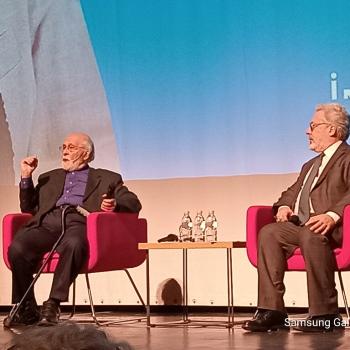Heaven's existence depends on the fact that Jesus Christ, as God, is man, and makes space for human existence in the existence of God himself. One is in heaven when, and to the degree, that one is in Christ. It is by being with Christ that we find the true location of our existence as human beings in God. Heaven is thus, primarily, a personal reality... (Joseph Ratzinger, Dogmatic Theology, Eschatology, The Catholic University of America, 1988, p. 234)
Jesus makes a space for us in himself, as we truly become the body of Christ. As I read this text that had preceded the Catechism, I immediately recognized the themes I had read earlier.
Cardinal Ratzinger's books and articles, and his production of the Catechism had mentored me and countless other lives as well. When he became our pope, many like me cheered that this wise and faith-filled teacher's instruction would have a world stage.
Christian hope has become one of the hallmarks of Benedict's papacy. His encyclical on hope, Spe Salvi, reminds us that we must imitate the saints, who imitate Christ: they open themselves to union with God, who first opens himself to us.
The Kingdom of God is a gift, and precisely because of this, it is great and beautiful, and constitutes the response to our hope. And we cannot—to use the classical expression—"merit" Heaven through our works. Heaven is always more than we could merit, just as being loved is never something "merited," but always a gift. However . . . our behavior is not indifferent before God . . .
We can open ourselves and the world and allow God to enter: we can open ourselves to truth, to love, to what is good. This is what the saints did, those who, as "God's fellow workers," contributed to the world's salvation (cf. 1 Co.r 3:9; 1 Th. 3:2). (Benedict XVI, Spe Salvi, par 35.)
As Pope Benedict renounces the papacy and enters the monastery, he continues to teach us with his example as he opens his life more to prayer and the One who knows his name. He owns what he professes. Benedict taught that the Catechism, as with all Christian study, ought to move us into greater possession of a relationship with God, the pearl of great price (Mt. 13:45-46.)
All of the "truths of faith" are explications of the one truth that we discover in them. And this one truth is the pearl of great price that is worth staking our lives of: God. He alone can be the pearl for which we give everything else. Dios solo basta ("God alone suffices")—he who finds God has found all things. But we can find him only because he first sought and found us. He is the one who acts first, and for this reason faith in God is inseparable from the mystery of the Incarnation, of the Church and of the sacraments. Everything that is said in the Catechism is an unfolding of the one truth that is God himself—the "love that moves the sun and all the stars." (Dante, Paradiso, 33, 145) (Joseph Cardinal Ratzinger, Gospel, Catechesis, Catechism, Ignatius, 1997, p. 33-34.)
Though we may wish it otherwise, even by renouncing the Chair of Peter, Benedict is showing us that "God alone suffices."
And hope is calling us on.





